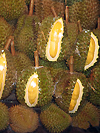|
durian
An edible fruit of the genus Durio of which
different variations exist, though the most common edible species is
Durio zibethinus, a name that also covers several subspecies, in
Thailand being:
thurian
mon thong
(ทุเรียนหมอนทอง),
thurian
kaan yao
(ทุเรียนก้านยาว),
thurian
kradum thong
(กระดุมทอง),
thurian
ihkop (ทุเรียนอีกบ),
thurian
ihluang (ทุเรียนอีลวง),
thurian
kasmpan (ทุเรียนกําปั่น), and
thurian
chanie (ทุเรียนชะนี).
Its fruiting season is from May to September. It is native to
Southeast Asia where it is known as the ‘king of
fruits’. The fruit has a
hard shell with sharp pikes (fig.) and a pungent, penetrating scent.
The local people say it smells like hell but tastes like heaven,
nevertheless it is banned
from most Thai hotels (fig.). The vanilla
coloured flesh of fruit
(fig.)
sits around large bean-shaped pits and has an unique taste, considered a real
delicacy by the locals. However, caution
should be exercised when eating the fruit, as they have a high calorific value
and excessive consumption in close
succession could be harmful.
Nutritional analysis of durians by the Nutrition Division of the Department of
Health shows that different cultivars have different energy values,
ranging from 181 calories per 100 grams for long-stemmed durians
(fig.), to 129 calories
for kradum durians, and in the case of candied durians, the calorific value is as
high as 340 calories. This means
for example that a 2 kilogram mon thong durian -one of the most popular varieties- with a
peeled weight of around 600 grams would give a total of around 978 calories. It
is thus advisable to eat no more than two segments of durian a day. Customary
practice is to combine the consumption of the ‘king of fruits’ with
mangosteen,
the ‘queen of fruits’, as the latter lowers the body
temperature and helps prevent stomach aches after durian
consumption. Durians, most often of the mon thong variety,
are also made into popular snacks such as fried chips or processed
into a paste (fig.),
known as durian cake or durian paste. However, many say it is best
enjoyed fresh, paired with sticky rice and
coconut milk.
In Thai
thurian.
See also THEMATIC STREET LIGHT (1)
and
(2).
回






|

